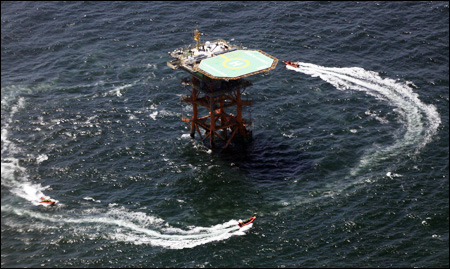
Seoul keeps tabs on China’s Ieodo moves

The issue of sovereignty over Ieodo, a submerged rock in the East China Sea, between Korea and China became more volatile Tuesday after media said Beijing could use unmanned drones to monitor the area. The reports added to soaring regional tensions over maritime jurisdiction.
Seoul officials said the government was looking into the reports, but that Beijing had yet to clarify its stance.
According to Chinese reports this week, Beijing plans to monitor uninhabited maritime features including Ieodo by 2015. While the move appeared to take aim at Japan, with which China is at loggerheads over the Diaoyu (Chinese name) / Senkaku (Japanese name) islands, it also falls in line with its hardening rhetoric on Ieodo.
“If China’s intention of surveillance is aimed at laying a jurisdictional claim to Ieodo, we will protest and request it to stop the measure,” a Seoul official said on condition of anonymity.
Beijing has this year stepped up its claim on the rock, which is 136 kilometers closer to the peninsula than the nearest Chinese territory. Many suspect China’s claim is tied to the expansion of its naval forces, and growing assertiveness over territorial disputes with East and Southeast Asian nations.
Ieodo rock became an issue in 1996 when the international community extended the maximum reach of EEZs to 200 nautical miles, created overlapping zones between countries. Ieodo sits in the overlap.
The sides have held 16 rounds of negotiations to decide on maritime delimitation in the East China Sea, with Seoul insisting the EEZ be determined in accordance with the principal of equidistance. Beijing calls for “the natural prolongation” of its land territory.
“Because the gap between the countries (over EEZ delimitation) is wide, we must find the time to address the matter from a long-term perspective,” the official said.
In 2003, Seoul built a maritime research station on the rock, which sits 4.6 meters underwater, strengthening its control, and signaling its will to protect the area it believes should fall within its EEZ. The East China Sea is rich with natural resources including oil.
The two countries are party to the U.N. Convention on the Law of the Sea (UNCLOS) and have the option of arbitration. But the experts said UNCLOS is subject to interpretation and the countries see third party involvement as risky.
South Korean Foreign Minister Kim Sung-hwan on Monday stressed the importance of promoting “correct history” at the United Nations.
A spate of maritime disputes have roiled the region in recent months, with Seoul and Tokyo locking horns over Dokdo and tension continuing to mount between China and Japan.
Foreign minister Kim Sung-hwan, in a meeting with his Chinese counterpart, Yang Jiechi in New York Monday, agreed that delimitation issues should be discussed in a timely matter.
It remains to be seen if the sides talk about the touchy matter.
In March, Liu Cigui, the director of China’s State Oceanic Administration, said Beijing would enhance maritime patrols and enforcement of domestic law over its areas of jurisdiction including Ieodo, prompting President Lee Myung-bak to strongly reiterate Seoul’s stance.
Watchers say Beijing is working on the modernization of its maritime forces and naval capabilities to enforce its jurisdictional claims. China also has had spats with the Philippines and Vietnam over their respective EEZs in the oil-rich South China Sea. <The Korea Times/Kim Young-jin>



